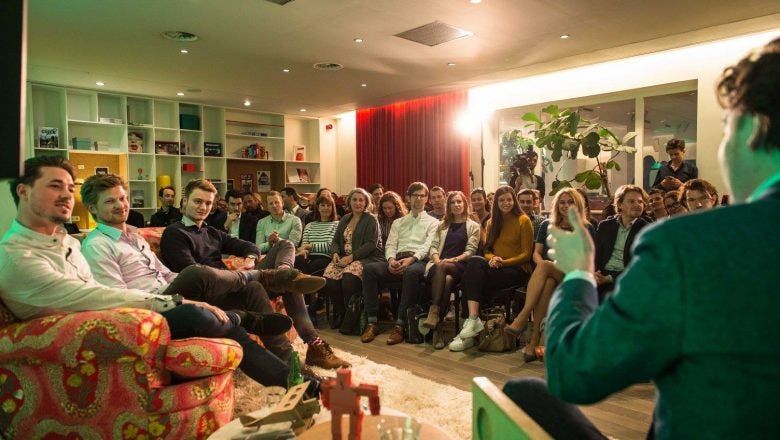
On Tuesday April 11th, Spaces Herengracht hosted the latest edition of Amsterdam Talks Tech. This edition’s theme was Smart Cities and Mobility, which was long overdue, considering it’s held in Amsterdam. Ironically enough, the event started 15 minutes late, as one of the speakers was delayed by traffic, emphasising the importance of what it is exactly they’re trying to achieve here. As always, the host of the evening was Remy Gieling, Sprout’s Editor in Chief. This night full of innovations, ambitions and networking gave us some idea of what the future will look like, and it is looking good. Here are the highlights of the evening in case you were stuck in traffic and had to miss it.
Smart solutions, tricky problems
A smart city is not called one because of its tech; a city is smart because it has a high quality of life. Cathelijne Hermans for Smart Mobility Amsterdam was one the first speakers to get on stage, and she is involved in making Amsterdam a ‘smart city’. We learned of all the mobility-related problems a European capital city faces, such as the increased amount of residents, visitors, tourists but a concerning lack of space. There is a plethora of initiatives to make a smart city out of Amsterdam, but a lot of these remain stuck in the pilot phase as scalability remains a problem. And not just scalability, but local governments are also a recurring theme. These governments offer their city as a playing ground, but refuse to go all-in when it comes to letting a pilot truly take off, creating a heavily monopolized big budget business market. And what about the future? Cathelijne thinks self-driving cars will take over, starting on the highways and inner cities later on. We can’t wait.
Free your mind
When it comes to dealing with traffic congestion, Raymond Gense of Next Urban Mobility has all the experience. Next Urban Mobility focuses on optimization of infrastructure and reducing the strain on overcrowded areas. Raymond has seen it all, and the crowd got some pointers on what to expect when you’re an innovator in the mobility business. Introducing the human aspect, Raymond stated that solutions remain stagnant because most people are reluctant to change their mindset. So when it really comes down to it, finding solutions for mobility-related issues is more related to psychology, than it is to technology. Combine this with a political landscape that is highly focused on economic protectionism instead of innovation, and you’ve got a problem. Luckily there is a silver lining to be found here, as the Dutch open approach towards data-availability for transportation creates lots of opportunities as well. And besides, things we thought to be impossible five years ago, are fully integrated in our daily lives today. So keep on innovating.
Mobility to the people
After a well deserved cocktail break, the next speakers were ready to take the stage. One of them is Parcompare’s Sven Snel, founder of the all-integrating mobility platform to get mobility solutions to the people. Parcompare connects mobility services to third parties. For example airport parking lots to airports, travel agents to trip organizers, taxi services to public transports, and so on. Already rooted deeply in the airport business, they want to adapt to fit better in city centres. Imagine arriving in Amsterdam, and your travel agent directly shows you how to reach your hotel. Their biggest asset just might be their platform, due to its reach and scalability. The ability to connect and sell, all at once, is what really works. And not just for companies, the people benefit as well. A win-win situation.
More than meets the eye
Possibly the most technologically advanced business of the evening, was that of Amber Mobility. Steven ‘the Amber guy’ Nelemans presented the Amber One; a futuristic, high performance shared electric car. You’d expect to find the Amber One in Silicon Valley, but it’s right here in the Netherlands. Admitted, the Dutch are a tough crowd. Investments are difficult, as is the openness to trying new things. Still, Amber Mobility wants to provide a subscription to mobility, charged per kilometre. Through trial and error at Eindhoven’s tech campus, they’ve managed to make it road proof. Now they want to get the real development going. The car is meant to be a shared car, so its purposes include ridesharing, being on the road 24/7, and never needing parking lots. It’s basically a Transformer, almost.
Ads on wheels
“Transport takes you from where you’re not, to where you want to be.” Tijmen de Vries of the Bikevertising Company had this slogan in his mind when he came up with the idea of his company. The idea of offering widely available bicycles that pay for itself through advertisement and rental costs caught on. As a token of good will, students ride the bikes for free, others pay 1 euro per hour. The available public transport bikes (OV-fiets) are never where you need them to be, difficult to obtain, and even worse to return. This is why the company wants to create a platform that allows owners of so-called bike fleets to integrate a smart system that knows where their bikes are, so you always know where a bike is available. The plan? Bicycle hubs all-around so you can pick up a bike at point A, and drop it off at point B, or even C, whatever works best. The Bikevertising Company collects this data to improve availability and give an accurate measuring of advertisements’ effectiveness. They’ve definitely constructed their company in a way that makes sure they’re here to stay.
After the speakers were done, the bar was the main focal point for the rest of the evening. Amazing cocktails, amazing people, and lots of networking. Here’s to another great edition of Amsterdam Talks Tech.
Want to see more images of the evening, see the full album on our Facebook.
Share this article
 Read now China: Booming business and the fine line of focus
Read now China: Booming business and the fine line of focus
 Read now Lagom, Just right...
Read now Lagom, Just right...